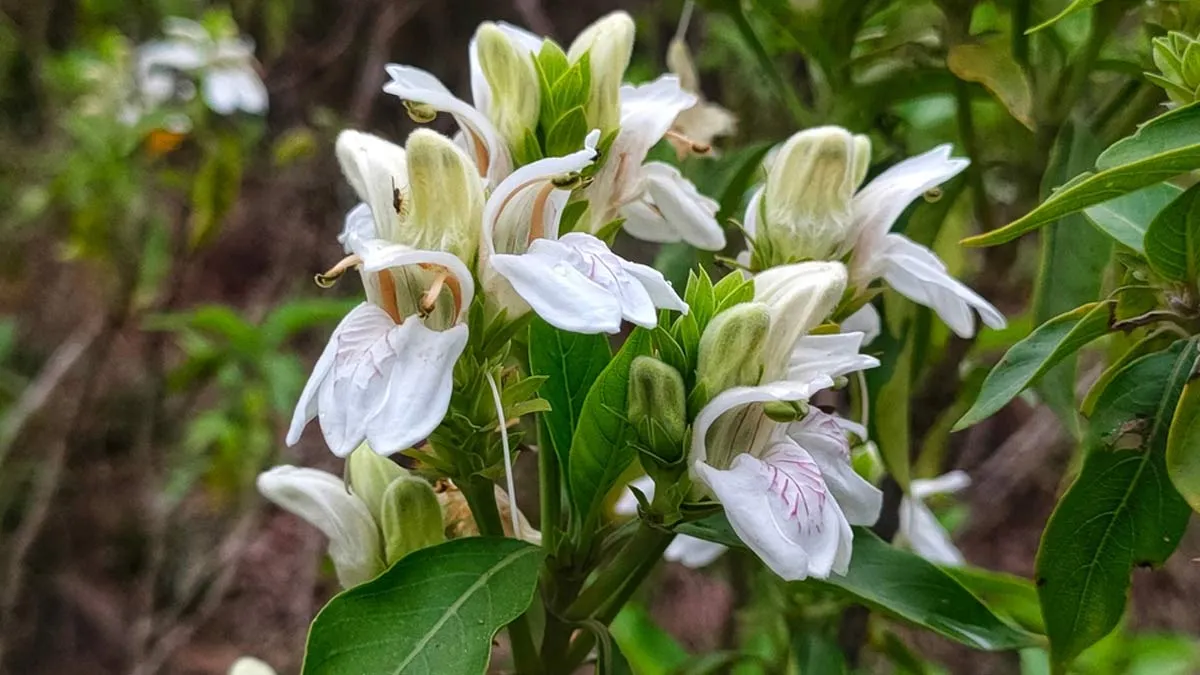
Adusa, scientifically known as Justicia adhatoda, is a medicinal herb renowned for its therapeutic properties, particularly in managing respiratory ailments. Native to South Asia, this evergreen shrub has been an integral part of traditional medicine systems like Ayurveda and Unani for centuries. Known for its anti-inflammatory, bronchodilatory, and antimicrobial properties, Adusa continues to gain recognition in modern pharmacological research.
Table of Content:-
Traditional Uses of Adusa

For generations, Adusa leaves and roots have been used to prepare herbal concoctions to alleviate symptoms of cough, cold, and asthma. The herb is rich in bioactive compounds, including vasicine and vasicinone, which are believed to impart its medicinal properties. Traditionally, it is consumed as a decoction, syrup, or tea to soothe respiratory discomfort and improve lung function.
Adusa and Cough
Cough, whether caused by infections or allergies, can be persistent and debilitating. Adusa acts as a natural expectorant, helping to loosen and expel phlegm. This property makes it particularly beneficial in managing wet coughs associated with conditions like bronchitis.
A study published in the Frontiers of Nutrition highlighted the efficacy of Adusa in reducing cough severity. The research indicated that vasicine, a key alkaloid in Adusa, stimulates the respiratory tract and aids in clearing mucus. This makes it a valuable natural remedy for individuals seeking relief from chronic coughing.
Adusa for Cold Relief

Colds are typically caused by viral infections, leading to symptoms like nasal congestion, throat irritation, and sneezing. Adusa possesses antimicrobial and anti-inflammatory properties, making it effective in soothing irritated airways and reducing inflammation. Its leaves are often boiled to prepare a steam inhalation remedy that clears nasal passages and alleviates discomfort.
A study states that adusa has antiviral properties and it was found that extracts of the herb exhibited significant activity against respiratory viruses, supporting its traditional use in treating colds and related symptoms.
Also read: Best Home Remedies To Beat The Winter Bug, From Chicken Soup To Hot Toddy
Managing Asthma with Adusa

Asthma, a chronic respiratory condition characterised by airway inflammation and bronchoconstriction, requires effective management to prevent severe symptoms. Adusa serves as a natural bronchodilator, relaxing the muscles of the airways and improving airflow to the lungs.
According to a study published in the European Journal of Medical Research, Justicia adhatoda’s active compounds showed significant potential in reducing asthma symptoms.
How to Use Adusa
Adusa can be incorporated into your wellness routine in several ways:

Decoction: Boil a few leaves in water and drink the strained liquid to relieve cough and cold symptoms.
Syrup: Prepare or purchase herbal syrups containing Adusa extracts for easier consumption, especially for children.
Steam Inhalation: Add Adusa leaves to hot water and inhale the steam to clear nasal and chest congestion.
Powder: Dried leaves can be powdered and mixed with honey for added flavour and efficacy.
Safety and Precautions
While Adusa is generally considered safe for consumption, it is important to use it responsibly. Excessive intake may cause side effects such as nausea or gastrointestinal discomfort. Pregnant and breastfeeding women should consult a healthcare professional before using Adusa, as its effects in such conditions are not well-documented.
Conclusion
Adusa (Justicia adhatoda) offers a wealth of benefits for individuals suffering from respiratory conditions like cough, cold, and asthma. Backed by traditional wisdom and scientific studies, the herb is a valuable addition to natural medicine cabinets. However, as with any herbal remedy, it is crucial to use Adusa under the guidance of a qualified practitioner, particularly when managing chronic conditions.
By embracing such time-tested remedies, we can not only find relief from common ailments but also reconnect with nature's profound healing potential.
Also watch this video
Read Next
From Boosting Immunity To Improving Digestion, Here’s Why You Should Consume Raw Turmeric In Winter
How we keep this article up to date:
We work with experts and keep a close eye on the latest in health and wellness. Whenever there is a new research or helpful information, we update our articles with accurate and useful advice.
Current Version
